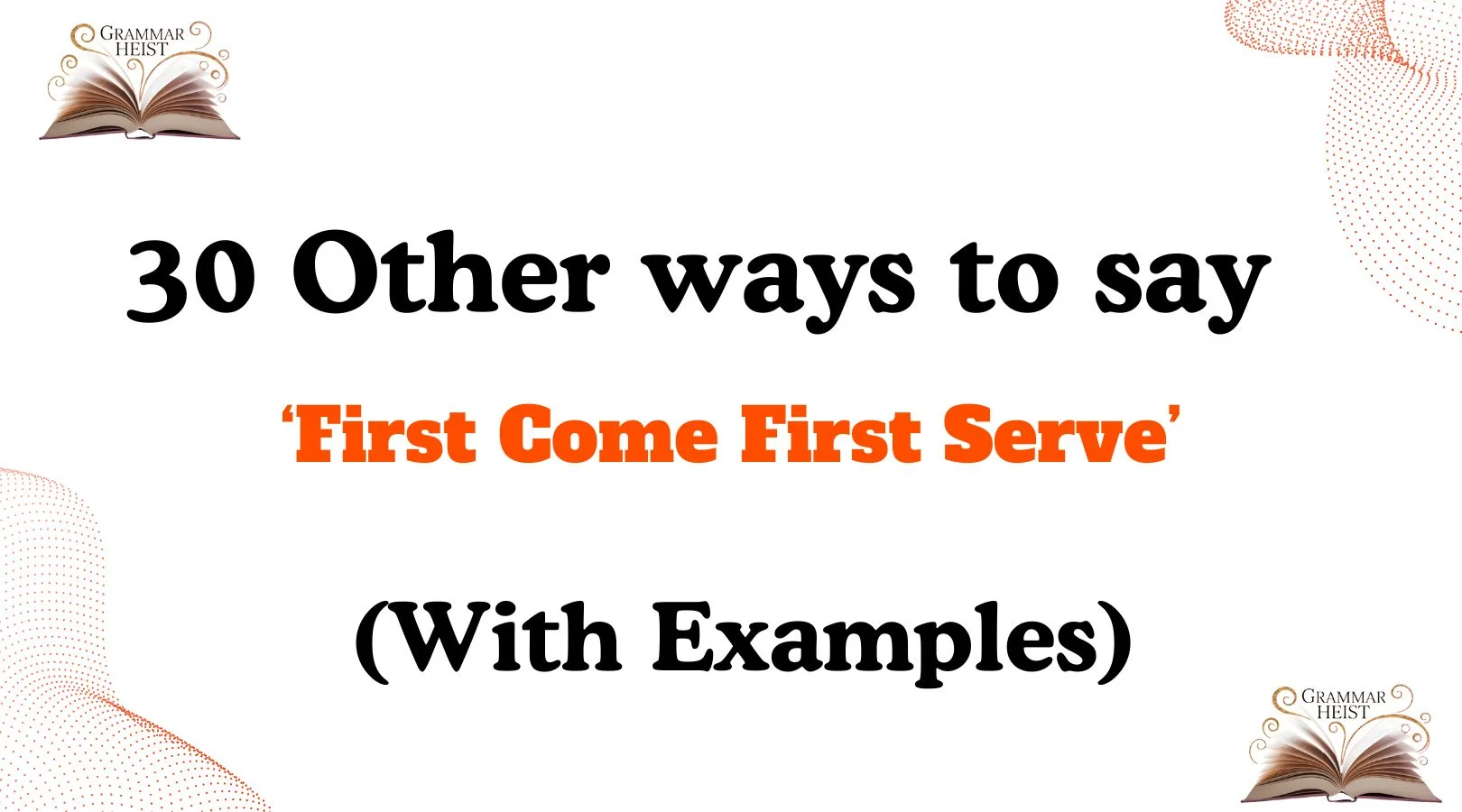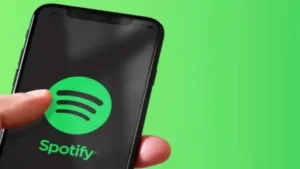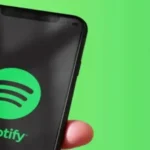Choosing the right words matters when we want to sound warm, professional, and thoughtful. Sometimes, phrases like “first come, first serve” can feel too direct or transactional. Finding gentle alternatives helps us communicate with more care, empathy, and clarity—whether it’s for work, events, or even casual settings. That’s why in this guide, we’ll explore 30 better ways to say “first come first serve,” with examples that make your words feel both professional and kind.
What Does “First Come First Serve” Mean?
The phrase “first come first serve” means that whoever arrives or requests something first gets priority. It’s often used for limited offers, seats, appointments, or opportunities. While common, it can sometimes feel cold or impersonal, which is why many people look for alternative expressions.
Is It Professional/Polite to Say “First Come First Serve”?
Yes, it’s widely understood and not considered rude, but in professional or customer-facing settings, it can feel a bit abrupt. Politer versions like “priority will be given to early requests” or “limited availability” add more warmth and respect to your message.
Pros and Cons of Using “First Come First Serve”
Pros:
- Short and clear.
- Universally understood.
- Works in both casual and formal situations.
Cons:
- May sound blunt.
- Lacks warmth and empathy.
- Can feel transactional rather than personal.
Synonyms For “First Come First Serve”
- Priority to Early Arrivals
- Limited Spots Available
- While Supplies Last
- Reserved for Early Participants
- Availability on a Rolling Basis
- Early Birds Get Priority
- Offered Until Capacity is Reached
- Subject to Availability
- First to Respond Gets It
- Spaces Allocated in Order of Request
- Priority Given to Prompt Action
- Limited Enrollment Opportunity
- Secured Upon Early Request
- On a First-Request Basis
- Until All Slots Are Filled
- Reward for Early Commitment
- Access Based on Timing
- Early Confirmation Advantage
- Opportunity Goes Quickly
- Granted to Swift Applicants
- Until Resources Are Gone
- Early Access Advantage
- The Sooner, The Better
- Initial Responses Honored
- Priority to Quick Registrations
- Exclusive to Early Joiners
- Timely Action Rewarded
- Limited-Time Priority
- Allocation Based on Timing
- Until All Are Reserved
1. Priority to Early Arrivals
Scenario: Announcing event seating.
Examples:
- “Seats are limited, and priority will be given to early arrivals.”
- “Please come on time—early guests will receive priority seating.”
- “We’re keeping it fair: priority goes to those who arrive first.”
Tone: Professional and polite.
Explanation: This phrase keeps things clear yet respectful, avoiding the bluntness of the original.
2. Limited Spots Available
Scenario: Workshop invitation.
Examples:
- “We have limited spots available—secure yours early.”
- “Don’t wait too long, as spots are limited and filling fast.”
- “Join us while seats last—limited availability applies.”
Tone: Warm and inviting.
Explanation: Highlights scarcity without sounding harsh.
3. While Supplies Last
Scenario: Product promotion.
Examples:
- “This offer is valid while supplies last.”
- “Hurry, the deal is available only until stock runs out.”
- “Special edition items are here, but only while supplies last.”
Tone: Direct but friendly.
Explanation: Common in sales, it conveys urgency with a neutral tone.
4. Reserved for Early Participants
Scenario: Online course sign-up.
Examples:
- “Exclusive bonuses are reserved for early participants.”
- “Sign up quickly—special seats are reserved for the first few.”
- “Rewards will be reserved for those who join earliest.”
Tone: Encouraging and respectful.
Explanation: Adds a sense of reward and recognition.
5. Availability on a Rolling Basis
Scenario: Job applications.
Examples:
- “Applications will be reviewed on a rolling basis.”
- “We encourage early applications as reviews are rolling.”
- “Opportunities remain open until positions are filled.”
Tone: Professional and formal.
Explanation: Common in academic and corporate settings, this feels polished.
6. Early Birds Get Priority
Scenario: Event tickets.
Examples:
- “Our early birds get first choice of seating.”
- “Tickets are open, and early birds will be rewarded.”
- “Special offers are available—early birds get priority.”
Tone: Friendly and playful.
Explanation: This adds lightness and positivity.
7. Offered Until Capacity is Reached
Scenario: Conference registration.
Examples:
- “Registrations are open until capacity is reached.”
- “The hall will remain open until we hit maximum capacity.”
- “We’re accepting attendees until the venue is full.”
Tone: Clear and neutral.
Explanation: Works when space is physically limited.
8. Subject to Availability
Scenario: Hotel booking.
Examples:
- “Rooms are allocated subject to availability.”
- “Special upgrades are provided based on availability.”
- “Reservations will be honored only if space remains.”
Tone: Formal and polite.
Explanation: Widely used in hospitality and travel, respectful yet firm.
9. First to Respond Gets It
Scenario: Giveaway announcement.
Examples:
- “The first to respond gets the prize.”
- “Quick replies matter—first responders win.”
- “Want it? Be fast—the first to reply claims it.”
Tone: Playful and casual.
Explanation: Great for social media or fun events.
10. Spaces Allocated in Order of Request
Scenario: Training session
Examples:
- “Seats are allocated in the order requests come in.”
- “Please register soon—requests will be honored in order received.”
- “Workshops fill fast, and spaces follow request order.”
Tone: Professional.
Explanation: Makes the process sound fair and transparent.
11. Priority Given to Prompt Action
Scenario: Online event registration.
Examples:
- “Priority will be given to those who act promptly.”
- “The earlier you respond, the more likely you’ll get a seat.”
- “We encourage prompt action for guaranteed participation.”
Tone: Professional and encouraging.
Explanation: This highlights the value of acting early without sounding harsh.
12. Limited Enrollment Opportunity
Scenario: Exclusive coaching program.
Examples:
- “We’re offering a limited enrollment opportunity.”
- “Join while you can—enrollment is capped for quality support.”
- “This is a limited enrollment offer, designed for early registrants.”
Tone: Formal and inviting.
Explanation: Perfect for education or training, it emphasizes exclusivity.
13. Secured Upon Early Request
Scenario: Hotel bookings or room reservations.
Examples:
- “Rooms are secured upon early request.”
- “Your seat will be guaranteed with an early request.”
- “Access is confirmed only if requested early enough.”
Tone: Polite and assuring.
Explanation: Works when you want to sound reliable yet stress urgency.
14. On a First-Request Basis
Scenario: IT service support.
Examples:
- “Assistance is provided on a first-request basis.”
- “Our resources are available based on the first requests we receive.”
- “We will respond in the order requests are made.”
Tone: Professional and clear.
Explanation: A slightly formal, yet transparent alternative.
15. Until All Slots Are Filled
Scenario: Limited group fitness class.
Examples:
- “Registration is open until all slots are filled.”
- “The class will remain open until every slot is taken.”
- “Hurry, as enrollment closes once slots are filled.”
Tone: Friendly and clear.
Explanation: Sounds less transactional than “first come first serve.”
16. Reward for Early Commitment
Scenario: Business loyalty program.
Examples:
- “Enjoy a reward for early commitment to our program.”
- “Special perks are given to those who commit early.”
- “We value dedication, so early commitments receive recognition.”
Tone: Positive and appreciative.
Explanation: Adds an emotional reward element to acting early.
17. Access Based on Timing
Scenario: Internship applications.
Examples:
- “Access will be based on the timing of applications.”
- “Your chances improve with timely submissions.”
- “We allocate opportunities based on when you apply.”
Tone: Neutral and fair.
Explanation: A straightforward choice that avoids sounding cold.
18. Early Confirmation Advantage
Scenario: Corporate training registration.
Examples:
- “Early confirmations enjoy an advantage in selection.”
- “Those confirming earliest will have priority placement.”
- “We offer extra benefits for early confirmations.”
Tone: Formal and professional.
Explanation: Adds a positive incentive for acting early.
19. Opportunity Goes Quickly
Scenario: Social media giveaway.
Examples:
- “This opportunity goes quickly—don’t miss it.”
- “Be ready; chances disappear fast.”
- “It’s a special offer, and opportunities vanish quickly.”
Tone: Fun and energetic.
Explanation: Casual, motivating language with urgency.
Read More:30 Other Ways to Say ‘Strong Work Ethic’ (With Examples)
20. Granted to Swift Applicants
Scenario: Job openings.
Examples:
- “Positions will be granted to swift applicants.”
- “Applicants who apply early stand a higher chance of success.”
- “We value initiative—swift applications are prioritized.”
Tone: Formal and professional.
Explanation: Encourages timeliness in formal opportunities.
21. Until Resources Are Gone
Scenario: Nonprofit food distribution.
Examples:
- “Support is offered until resources are gone.”
- “We will continue distribution until supplies run out.”
- “Help remains available as long as resources last.”
Tone: Respectful and empathetic.
Explanation: Works well in community or charity contexts.
22. Early Access Advantage
Scenario: Membership perks.
Examples:
- “Members get an early access advantage to new products.”
- “Enjoy priority through early access benefits.”
- “Exclusive deals with your early access advantage.”
Tone: Exclusive and rewarding.
Explanation: Makes people feel special and valued.
23. The Sooner, The Better
Scenario: Group project participation.
Examples:
- “When joining, the sooner, the better.”
- “Opportunities open now—the earlier you act, the better.”
- “This works best when done sooner rather than later.”
Tone: Casual and conversational.
Explanation: A natural phrase that feels gentle and flexible.
24. Initial Responses Honored
Scenario: Feedback collection.
Examples:
- “Initial responses will be honored first.”
- “We’ll prioritize the earliest feedback received.”
- “Responses are welcomed, but initial ones take priority.”
Tone: Formal yet kind.
Explanation: Encourages people to respond sooner while being fair.
25. Priority to Quick Registrations
Scenario: Sports tournament.
Examples:
- “Quick registrations receive priority spots.”
- “Your team’s spot is secure with early registration.”
- “We give priority to quick and complete sign-ups.”
Tone: Polite and straightforward.
Explanation: Adds clarity in competitive sign-ups.
26. Exclusive to Early Joiners
Scenario: Club membership.
Examples:
- “Special perks are exclusive to early joiners.”
- “Early members enjoy exclusive benefits others miss.”
- “This deal is exclusive to those who join first.”
Tone: Rewarding and warm.
Explanation: Highlights exclusivity and belonging.
27. Timely Action Rewarded
Scenario: Limited-time promotions.
Examples:
- “Your timely action will be rewarded with a bonus.”
- “Rewards are reserved for those who act in time.”
- “Taking quick action means special recognition.”
Tone: Encouraging and positive.
Explanation: Adds motivation to act quickly.
28. Limited-Time Priority
Scenario: Holiday discount campaign.
Examples:
- “Enjoy limited-time priority when shopping early.”
- “Special offers carry priority for a short period.”
- “This is a limited-time priority opportunity.”
Tone: Marketing-focused and urgent.
Explanation: Great for time-bound campaigns.
29. Allocation Based on Timing
Scenario: Business resource distribution.
Examples:
- “Resources will be allocated based on timing.”
- “We process requests in the order received.”
- “Benefits are shared according to timing of requests.”
Tone: Neutral and professional.
Explanation: Maintains fairness without sounding harsh.
30. Until All Are Reserved
Scenario: Concert tickets.
Examples:
- “Tickets remain on sale until all are reserved.”
- “Seats are open until every spot is reserved.”
- “Bookings close once everything is reserved.”
Tone: Polite and inclusive.
Explanation: Offers clarity and politeness without bluntness.
Conclusion
The phrase “first come first serve” is short and common, but it doesn’t always capture the warmth and professionalism we want to show in our words. By choosing thoughtful alternatives, you can express urgency and fairness without sounding cold or transactional. Whether in business, education, events, or everyday life, these 30 alternatives make your communication feel clear, caring, and human.

Emma Rose is a dedicated writing expert with a passion for helping others enhance their communication skills. With a strong background in grammar, language structure, and style, Emma empowers individuals to write with clarity, confidence, and impact. Her approach combines a keen attention to detail with a supportive, personalized touch, ensuring each person she works with improves and grows in their writing journey.













